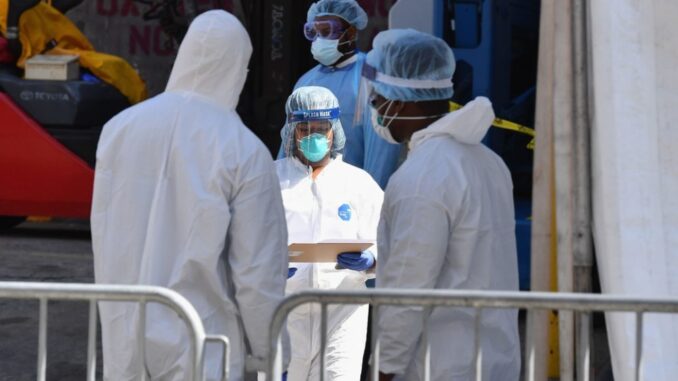
The decision by the Lagos State government to suspend indefinitely the planned re-opening of schools, places of worship and entertainment centres should be simply regarded as a judicious move in the light of the rising cases of the coronavirus disease. Despite pressure from various quarters persuading the state government to re-open schools and religious places, this bold pronouncement of the Lagos State government is a clear demonstration of authority and thoughtful leadership amid crisis.
As new cases of the disease are being established and escalation detected with increased testing nationwide, other states of the federation should emulate the Lagos State government by maintaining the lockdown on schools, worship centres and schools where it is so, and effect a lockdown where schools and worship places have resumed activities.
Undoubtedly, the suspension of those social services in Lagos State is justified since Lagos has become the epicentre of the viral infection. With about 18,000 cases nationwide and Lagos carrying no fewer than 8,000 of such cases, it is instructive that utmost precaution be taken by the state government. Yet, it stands to reason that the overwhelming workload of health professionals and care-givers, the non-availability of testing centres and the gross violation of the COVID-19 protocols and indiscipline displayed by Nigerians, have made such an action imperative for other states of the federation.
The reason for this is simple common sense. Beside the modest expansion of testing, which has led to more detection, there seems to be no correlation between the spike in the new cases and the easing of the lockdown. If there is any doubt about the consequences of a poorly managed relaxation of the lockdown, Nigerian authorities should take a cue from countries like India, Israel, the United Kingdom and other countries where easing of the economy and re-opening of schools led to the spike in new cases of COVID-19. In India, for instance, the easing of the lockdown saw spikes of new cases in tens of thousands, whilst in Israel, the easing of the nationwide confinement led to a dramatic spike by 1000 new cases. Unprecedented spikes in new cases were also recorded in the United States of America, the United Kingdom, amongst other countries.
If this is the global situation, why are we not learning from the flaws of other climes? Are we following blindly? Did Nigeria lock down because other countries did so? State officials and the general public should understand that unlike such countries, people here are on their own. State governments have also admitted that they have been overwhelmed by the enormousness and complexity of the pandemic.
With the benefit of hindsight, it is now clear that the initial plan for staggered classes for students was going to be a precarious adventure. Whilst we empathise with parents, students, proprietors that schools cannot resume as of yet, the government must not be put under any pressure to resume the usual academic activities. How could we have controlled and managed the interaction of students with peers and teachers? How ready would have been teachers and school workers to commit themselves to effect COVID-19 protocol? In simple precautions as washing with soap and water, how many schools would have been able to provide potable water let alone the provision of soaps?
How would the ministries of education nationwide have coped?
This same situation applies to churches, mosques and other religious places, many of whose leaders had criticised governments for locking down religious places whilst opening markets and working places.
Nigerians, government and all, should give thoughtful consideration to the unpredictable situation and overwhelming task befalling those at the front-line. In news reports, the chair of the Lagos State chapter of the Nigeria Medical Association COVID-19 task force, Dr. Japheth Olugbogi, was alleged to have stated that there were not enough testing going on. He blamed this on the lack of capacity in our healthcare system, the overwhelming work situation caused by the escalation in new cases, and the inaccessibility to testing by many others. Only a few days ago, the Nigeria Association of Resident Doctors (NARD) embarked on a nationwide industrial action over unfavourable working condition. Had students and teachers, congregation and worshippers been caught up in this, how would the country have managed the calamity?
Besides, prevailing events worldwide have come to suggest that the management of COVID-19 is a brutal challenge to man’s ingenuity and social existence. Because little is known and understood about COVID-19 and its dynamics, the pandemic has humbled even the scientific community. As more and more research works are being carried out to understand the behaviour or pathogenesis of the virus, there are wild speculations and conspiracy theories that have left people more confounded than curious.
Furthermore, there is skepticism on the part of many Nigerians over the sincerity of the government in being exemplars of the protocols for safety. We witness political activities, social gathering and people in high places flying around without reprimand from law enforcement agencies. This cynicism has been heightened by people’s claims that they are unaware of patients around them who have died of COVID-19.
In the light of global confusion, it is only fitting that Nigerians adhere to the protocol for healthy and safe living. Individuals must be reasonable enough to take personal responsibility for their safety and wellness. This can only be augmented by community engagement.
Therefore, we insist that schools, religious places and entertainment centres must remain locked down until Nigerians are enlightened enough to understand the gravity of COVID-19 and appreciate the need to take personal responsibility to safeguard themselves and others, maintain physical distancing, wear their face masks as prescribed and follow other protocols of safe living during this period of the pandemic. But this would only make sense if there is stringent enforcement of the COVID-19 protocols.
END

Be the first to comment